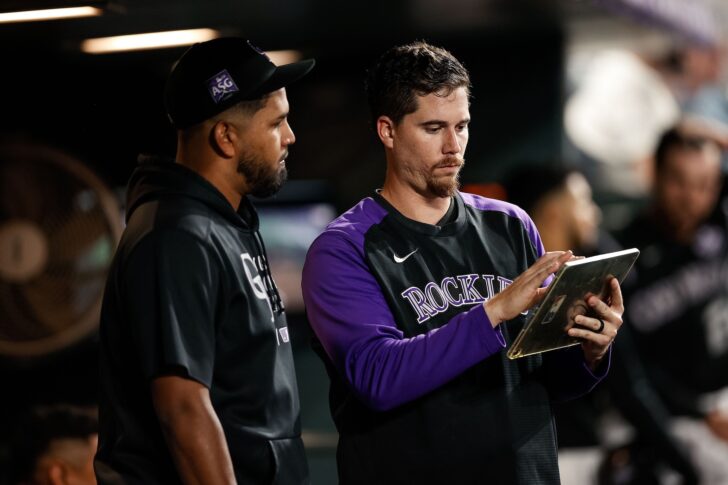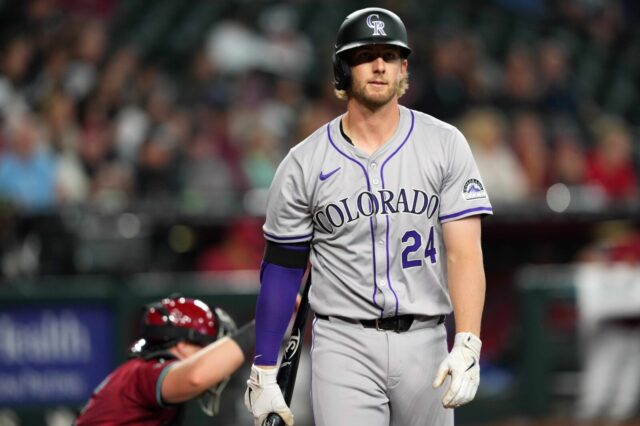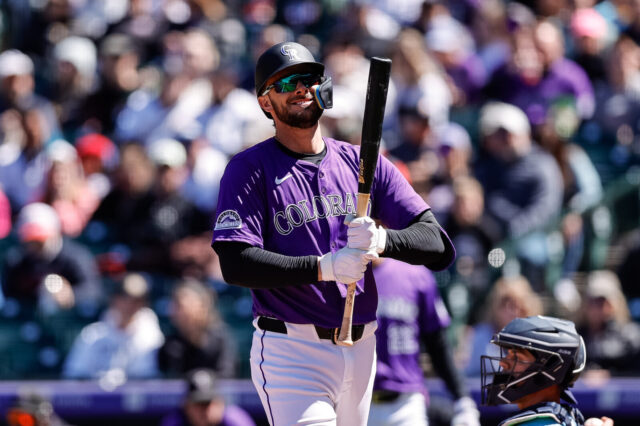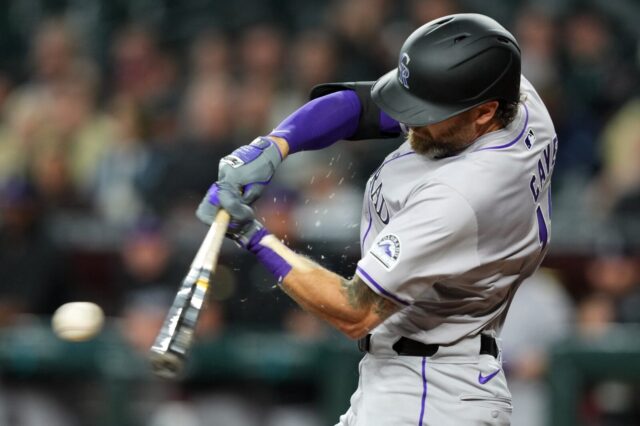The Colorado Rockies’ starting rotation entered 2021 widely viewed as the strength of the team, and for good reason. Ace Germán Márquez over the previous few seasons established himself as one of the best starters in baseball, and Jon Gray, Kyle Freeland, and Antonio Senzatela had all experienced varying degrees of success behind him.
All of that came to fruition at certain points over the course of 2021, but overall, the Rockies’ rotation didn’t quite live up to its billing. Colorado starters finished the season roughly middle of the pack in WAR, with injuries and inconsistent performances taking their toll.
The success of the rotation as a whole largely had to do with the group’s ability to avoid hard contact. Colorado starters yielded the seventh-lowest barrel percentage in baseball, and they did so despite throwing a higher percentage of pitches in the strike zone than any other rotation in the game. They also induced more grounders than any other group of starters in the majors. Finally, the unit ended the season with the fifth-lowest walk rate in the NL, giving them a list of accomplishments that ordinarily would correlate with a high number of wins–or, at least, solid traditional pitching numbers.
The problem for the Rockies, as is usually the case, is that their starters don’t generate a lot of strikeouts, and they finished with the third-lowest K% in the NL in 2021. We know that even soft contact can cause trouble, particularly in a park that rewards any just about any sort of contact through the air. The end result was a park-adjusted ERA figure that placed the Rockies right at league average, and that’s just not good enough for a team that has the type of relief pitching and offensive issues that Colorado carries.
Most Valuable and Biggest Disappointment: Germán Márquez (3.4 fWAR, 2.6 rWAR)
Márquez’s status as a first-time All-Star was solidified with a 12-start stretch between May and July during which he posted a 2.16 ERA with 80 strikeouts and just 21 walks in 79 innings. The Rockies went 9-3 in those starts. The problem is, outside of that stretch, Márquez just wasn’t very good.
The Rockies’ ace tossed a scoreless inning that included a strikeout in front of his home fans during the All-Star Game, but from that point through the remainder of the season, Márquez put up a 6.12 ERA while allowing opposing hitters to post a .285/.340/.495 slash line. Not what you want from your No. 1 starter, to be sure.
Márquez’s biggest issue was a career-high walk rate of 3.2 per nine innings, a number only made to look decent because of the fact that he still managed to strike out nearly a batter per inning. Beyond that, he lost a tick off of his fastball and increased his slider usage drastically over the previous couple of seasons, a pitch mix decision that seems questionable given its status as a below-average part of his repertoire.
The 26-year-old right-hander is still one of the game’s very best hurlers when he’s on, but he’s got to figure out how to remain consistent over the course of a full season. Part of that is sticking to his strengths, which include a usually well-commanded fastball and a devastating curve ball.
Least valuable: Chi Chi Gonzalez (0.2 fWAR, -0.8 rWAR)
Had the Rockies not dealt with injuries sustained by Kyle Freeland and Austin Gomber, Gonzalez wouldn’t have made 18 starts. But he did, and it’s somewhat damning that Bud Black didn’t have anyone better to choose from in those situations. Gonzalez somehow racked up more than 100 innings, posting a 6.46 ERA while striking out fewer than five batters per nine. He predictably had the highest home run rate and line drive rates on the staff.
Gonzalez was designated for assignment following the conclusion of the season and is now a free agent.
Biggest surprise: Antonio Senzatela (1.8 rWAR, 3.5 fWAR)
Senzatela was the Rockies’ best starter in terms of Fangraphs’ WAR, and it largely had to do with his stellar walk rate, which was the lowest of any NL pitcher who logged at least 150 innings. In addition, only two NL pitchers were better at supressing home runs than Senzatela, who yielded just 12 in 156 2/3 innings.
Of course, for the second consecutive season, Senzatela also posted the lowest strikeout rate in the NL. He is the prototypical Rockies pitcher who thrives on getting ground balls (fifth-highest GB% in the NL) and limiting hard contact (eighth-lowest barrel percentage), and he’s getting to the point where any resulting success can’t be categorized as a fluke. Knowing that, the Rockies signed Senzatela to a five-year, $50.5 million extension, which isn’t a bad deal for a proven back-end starter.
What happens next?
Jon Gray started strong but faltered down the stretch and is now a free agent. Both sides have expressed interest in a deal, but nothing seems imminent. Gray, who wants to test the market, can point to his performance through July 30, at which point he owned a downright decent 3.62 ERA in 19 starts. But he might not want to draw attention to his post-trade deadline numbers; Gray posted a 6.85 ERA over his final 10 starts, though he did rack up 62 strikeouts in 44 2/3 innings during that span. In many ways, his final couple of months were indicative of his career to this point in that Gray possesses a tantalizing ability to miss bats but often runs out of gas and fails to maintain any semblance of consistency as a result.
Kyle Freeland and Austin Gomber, both of whom had flat-out dominant stretches over the course of the season, will make for strong middle of the rotation. Freeland appears to have put a horrible 2019 season behind him by putting together two solid, if not unspectacular, bounce-back efforts. Gomber was maddeningly inconsistent but often showed the ability to mercilessly pound the strike zone to intriguing results.
The Rockies may want to add a starter to stabilize the back end of the group, lest they be stuck with the likes of Peter Lambert–a former highly touted prospect who has shown no ability to miss bats in the majors–or rush a seemingly not ready Ryan Rolison. A reunion with Tyler Anderson seems like the type of move the Rockies would make in the likely absence of potentially higher impact additions such as Robbie Ray, Alex Wood, or Colorado native Kevin Gausman, just to name a few. Groundball specialist Steven Matz might be someone worth paying attention to, though he might have pitched himself out of the Rockies’ price range with a solid performance for the Toronto Blue Jays in 2021.



